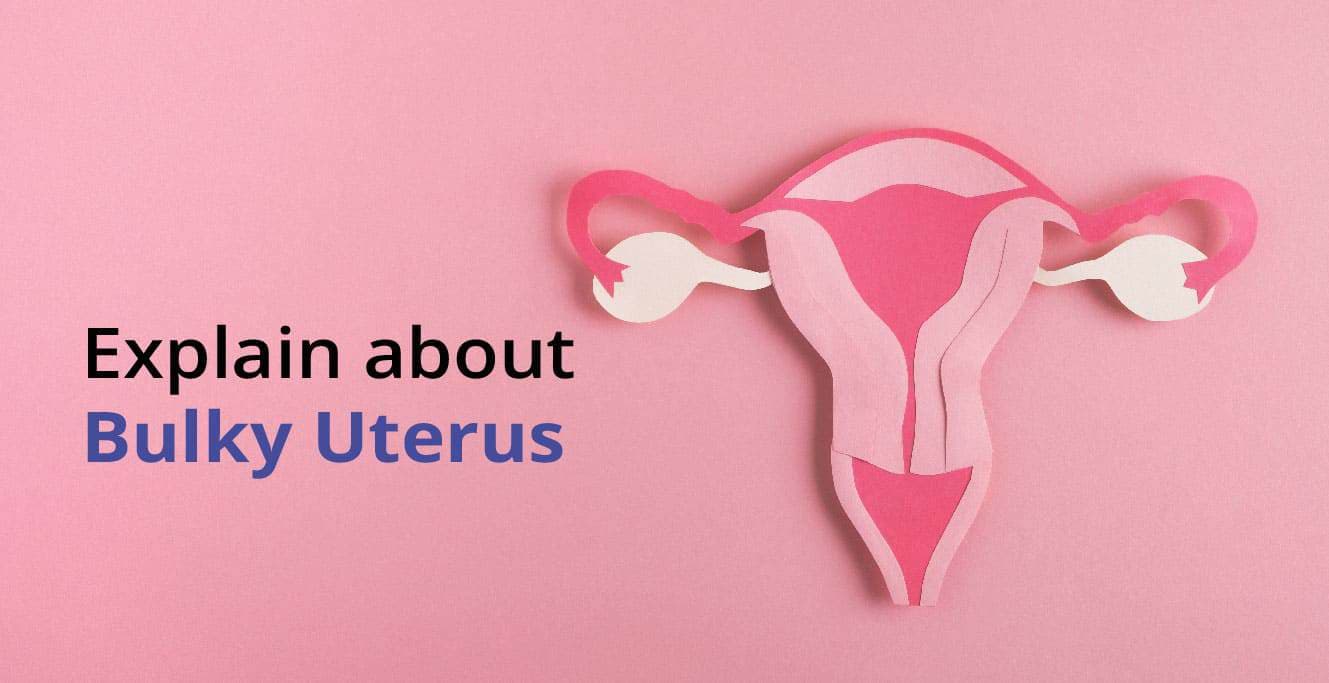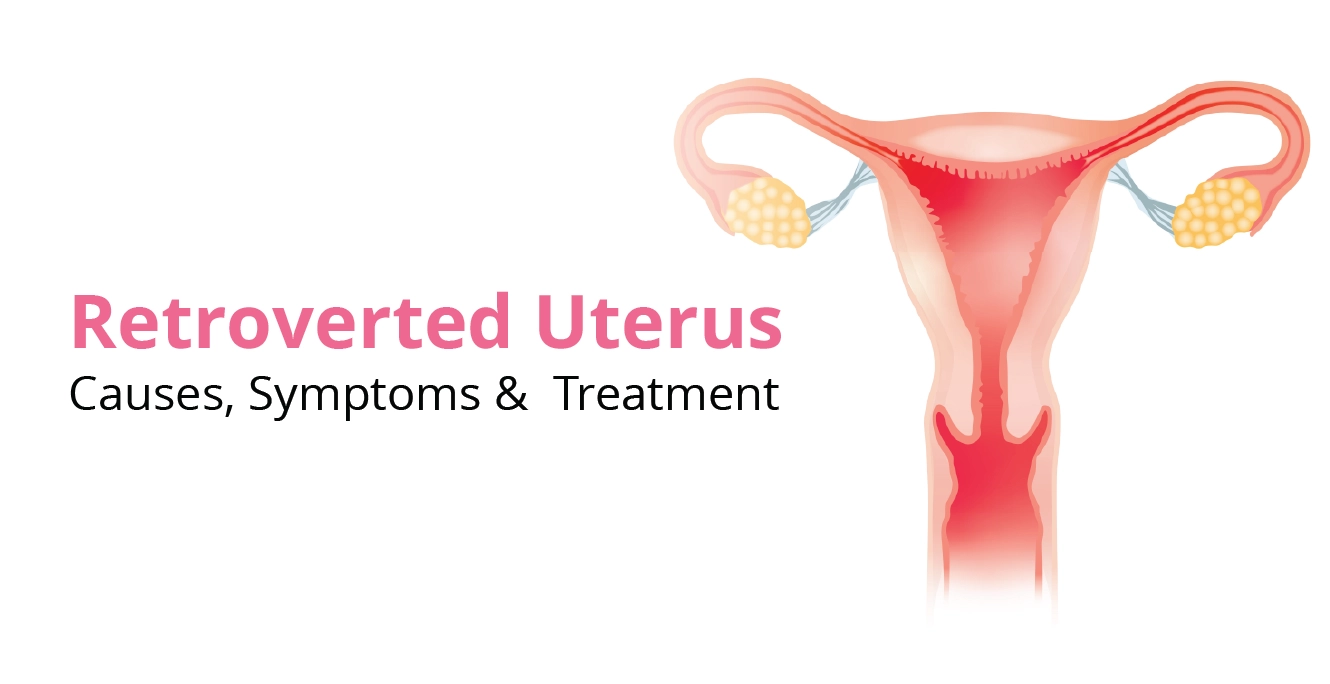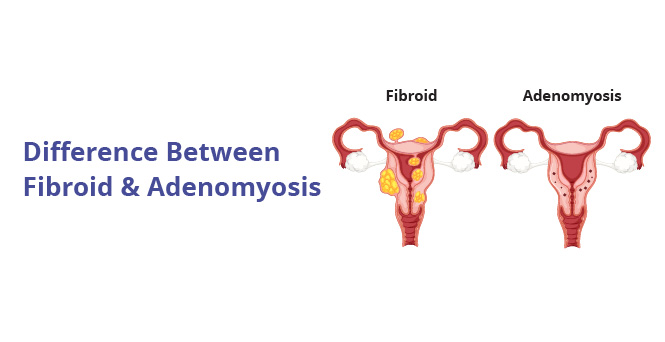
Bulky Uterus – Symptoms, Causes and Treatment

Table of Contents
- Quick Highlights
- Normal vs Bulky Uterus: What are the Differences?
- Mild Bulky Uterus
- How Does a Bulky Uterus Impact Fertility?
- Symptoms of a Bulky Uterus
- Causes of a Bulky Uterus
- Impact of a Bulky Uterus on Pregnancy
- Diagnosis of a Bulky Uterus
- Treatment of a Bulky Uterus
- Other Complications Related to a Bulky Uterus
- Takeaway
- FAQs
Quick Highlights
|
What is a Bulky Uterus?
- An enlarged uterus, which is larger than its usual size of ~7 to 8 cm in length, 5 cm in width, and 4 cm in thickness, is considered a bulky uterus.
- During pregnancy, the expansion of the uterus is normal, but otherwise an abnormal increase in size may indicate an underlying health condition.
- There are a number of reasons for a bulky uterus. It is important to understand that it is not a disease in itself but rather a symptom of any other medical issue.
- The common reasons for enlargement are hormonal imbalances, abnormal tissue growth, or chronic inflammation.
- For some women, a bulky uterus does not cause any noticeable symptoms and may only be detected during routine pelvic exams or imaging tests.
- In some cases, it can lead to discomfort, menstrual irregularities, and even complications related to fertility and pregnancy.
Normal vs Bulky Uterus: What are the Differences?
Understanding the impact of a bulky uterus is crucial for its effective management and treatment. Here is a comparison between a Normal uterus vs enlarged uterus (bulky uterus).
| Factor | Normal Uterus | Bulky Uterus |
| Size | About 7–8 cm in length, 4–5 cm in width | Often 9–12 cm or more in length; width >50 mm |
| Shape | Upside-down pear and smooth contour | It can appear:
– Rounded – Irregular, or – Aasymmetrical |
| Symptoms | No symptoms since this is a healthy condition | Symptoms may include:
– Heavy periods – Pelvic pain – Backache – Bloating, or – Pressure on the bladder |
| Reasons | A normal uterus is a sign of a healthy reproductive system | Reasons can be:
– Fibroids – Adenomyosis – PID – Ovarian cysts – Hormonal changes, or – Pregnancy |
| Impact on Fertility | Normal reproductive function | Depends on the cause. For e.g. large fibroids or adenomyosis may affect implantation or increase miscarriage risk |
Mild Bulky Uterus
A mildly bulky uterus refers to a slight increase in uterine size compared to the normal measurement. This mild change usually does not cause any noticeable symptoms and may be discovered only during a routine scan. The reasons can be natural hormonal variations, after childbirth, or in the early stages of pregnancy. In most cases, a mildly bulky uterus is not harmful, though doctors may recommend monitoring if symptoms develop.
How Does a Bulky Uterus Impact Fertility?
A bulky uterus can significantly affect reproductive health. The main ways it impacts fertility include:
- Difficulty conceiving: An enlarged uterus may disrupt ovulation or create a hostile environment for sperm.
- Failure of implantation: Conditions like fibroids and adenomyosis interfere with the embryo’s ability to implant in the uterine lining.
- Increased risk of miscarriage: Structural abnormalities in the uterus can cause early pregnancy loss.
- Complications during pregnancy: A bulky uterus can lead to preterm labour, abnormal foetal positioning, and delivery complications.
Symptoms of a Bulky Uterus
The bulky uterus can have multiple symptoms, which can also overlap with other conditions associated with the female reproductive system. These include:
- Menstruation gets impacted; you might experience painful stomach cramps and heavy bleeding, which can lead to anaemia
- You may experience swelling and cramps in the legs and backaches
- A feeling of pressure in the areas around the uterus
- After reaching menopause, one can still experience bleeding
- A vaginal discharge
- Physical pain during sexual intercourse
- Frequent and quick urge to urinate
- Pain during sexual intercourse
- Weight gain and mass around the lower abdomen
- Acne and excessive hair growth
- Breasts may feel abnormally tender
- Constipation and, in some cases, an urge to urinate, frequently
- The skin can become pale
- Experiencing fatigue and weakness
Reach out to your medical care provider to get access to the right diagnosis and treatment if you experience these symptoms.
Causes of a Bulky Uterus
Several medical conditions can cause a bulky uterus, including:
-
Fibroids
Fibroids are non-cancerous growths in the uterus that vary in size and number. While rare, large uterine fibroids can sometimes compress or distort the fallopian tubes, indirectly causing blocked fallopian tubes.
Symptoms include: Heavy menstrual bleeding, prolonged periods, pelvic pain, back pain, and frequent urination.
-
Multiple Fibroids / Intramural Fibroid
When fibroids occur in clusters or grow within the uterine wall (intramural), they often make the uterus bulky. This can sometimes interfere with fertility and cause significant discomfort.
Symptoms include:Heavy bleeding, pelvic pressure, and painful periods
-
Endometrial Cancer
It is a type of cancer that originates in the lining of the uterus, called the endometrium.
Symptoms include: Abnormal bleeding, pelvic pain, weight loss, and postmenopausal bleeding.
-
Adenomyosis
It is a condition in which endometrial tissue grows and develops into the uterine muscle, resulting in a bulky uterus with adenomyosis.
Symptoms include: Heavy periods, severe menstrual cramps, pelvic pain, and bloating.
-
Polycystic Ovary Syndrome (PCOS)
It is a hormonal disorder that causes irregular ovulation and cyst formation in the ovaries.
Symptoms include: Irregular periods, excessive hair growth, acne, weight gain, and female infertility.
-
Ovarian Cysts
These are the fluid-filled sacs that form on or inside the ovaries. They are also a reason for a bulky uterus.
Symptoms include: Bloating, lower abdominal pain, irregular periods, and difficulty conceiving.
-
Pelvic Inflammatory Disease (PID)
Long-standing infection of the reproductive organs can cause inflammation and swelling of the uterus, sometimes leading to enlargement.
Symptoms include: Pelvic pain, irregular bleeding, pain during intercourse, and fever in acute cases.
Impact of a Bulky Uterus on Pregnancy
A bulky uterus can sometimes influence pregnancy, depending on the underlying cause of the enlargement. While mild enlargement due to early pregnancy is normal and harmless, conditions like fibroids, adenomyosis, or multiple uterine growths may have some effects:
| Effect | How does it impact? |
| Fertility Challenges | Large fibroids or adenomyosis can interfere with implantation or increase the risk of miscarriage in some cases. |
| Pain and Discomfort | Women with a bulky uterus may experience pelvic pressure, back pain, or cramps during pregnancy. |
| Pregnancy Complications | In rare cases, significant uterine enlargement from fibroids or adenomyosis can increase the likelihood of preterm labour, restricted fetal growth, or complications during delivery. |
| Monitoring Needs | Pregnancies with a bulky uterus are often monitored more closely through ultrasounds and check-ups to ensure both mother and baby remain healthy. |
It is important to note that many women with a bulky uterus, especially mild enlargement, have completely normal pregnancies. Early consultation with a gynaecologist helps in managing any potential risks and ensures a safe pregnancy journey.
Diagnosis of a Bulky Uterus
Your doctor may use a combination of physical examination, imaging tests, and some lab tests to identify the underlying cause of a bulky uterus and develop an appropriate treatment plan.
-
Pelvic Examination
Your gynaecologist may perform a manual pelvic exam to assess the size, shape, and consistency of the uterus. This can help identify any obvious enlargement or irregularities.
-
Ultrasound
Ultrasound is the most common and effective tool for diagnosing a bulky uterus. It helps detect:
- Fibroids (single or multiple)
- Adenomyosis
- Ovarian cysts
- Early pregnancy changes
-
MRI (Magnetic Resonance Imaging)
MRI provides detailed images of the uterine structure and is often used when ultrasound findings are unclear or when adenomyosis or complex fibroids are suspected.
-
Blood Tests & Hormonal Evaluation
Blood tests may be conducted to check hormone levels, detect infections, or screen for conditions like PCOS that can contribute to uterine enlargement.
-
Hysteroscopy / Endometrial Sampling
In some cases, a hysteroscopy or endometrial biopsy may be recommended to examine the uterine lining, especially if there are abnormal bleeding patterns or suspicion of endometrial cancer.
Treatment of a Bulky Uterus
The treatment for a bulky uterus depends on the underlying cause, severity of symptoms, and fertility concerns. Common approaches include:
Treating Fibroids
- Medications: Hormone treatments can help control fibroid growth and manage symptoms like heavy bleeding and pain.
- Surgery: Options include myomectomy (removing the fibroids) through small cuts or a larger incision, and uterine artery embolisation to block blood flow to the fibroids and shrink them.
Treating Adenomyosis
- Medications: Hormone treatments can help with heavy bleeding and pain.
- Surgery: In severe cases, surgery may be needed to remove the adenomyotic tissue or the whole uterus (hysterectomy).
Lifestyle changes
A healthy lifestyle not only helps manage a bulky uterus and supports the treatment, but it is also important for improving and maintaining overall well-being.
✅ Healthy Diet:
– Fuel your body with a mix of fruits, veggies, whole grains, and lean proteins to keep your uterus happy.
– Avoid consuming processed foods and cut back on sugar to keep your hormones in check.
– Adding anti-inflammatory foods like turmeric and ginger might also help soothe any discomfort.
✅ Regular Exercise:
– Staying active with walks, swimming, or yoga not only keeps your weight in check but also helps lower stress.
– Less stress means less strain on your uterus, so it’s a win-win.
✅Weight Management:
– Keeping your weight healthy is key, as being overweight can increase the risk of a bulky uterus.
– A balanced diet combined with exercise can help you stay on track.
✅ Stress Reduction:
– Take a moment for yourself, whether it is yoga, meditation, or just deep breathing.
– Stress can make things worse, so finding ways to relax is important for your overall health.
Other Treatment Options
- Hysteroscopy: A procedure to remove polyps or other growths inside the uterus.
- Hormone therapy: To control hormone imbalances and shrink the uterus.
- IVF: For women having trouble getting pregnant because of a bulky uterus, in vitro fertilisation(IVF) may be recommended.
Other Complications Related to a Bulky Uterus
Aside from fertility concerns, a bulky uterus can lead to various complications, including:
- Chronic pelvic pain: Persistent pain affects daily activities and quality of life.
- Urinary problems: An enlarged uterus may exert pressure on the bladder, leading to frequent urination or difficulty emptying the bladder.
- Digestive issues: Constipation and bloating due to the uterus pressing against the rectum.
- Increased risk of anaemia: Excessive bleeding can lead to iron deficiency and fatigue.
Takeaway
A mild, bulky uterus can be normal, but if you are experiencing any unusual symptoms of a bulky uterus, consult your doctor for the right diagnosis and treatment so that neither your health nor your fertility goals are compromised. Approaching a good fertility specialist can also help you address it carefully. To seek the best treatment for infertility concerns, visit Birla Fertility and IVF, or book an appointment with Dr Prachi Benara.
FAQs
-
What is the normal size of the bulky uterus?
It is about 3 to 4 inches by 2.5 inches. Sometimes women can experience a bulky uterus, meaning enlargement to two to three times its normal size.
-
How can I reduce my bulky uterus naturally?
Your doctor will prescribe some anti-inflammatory medication to reduce it uninvasively.
-
What happens when the uterus is bulky?
A bulky uterus grows to about two to three times the size of a normal uterus. Bulky uterus symptoms are easily evident, such as heavy bleeding during periods, backaches, swelling and cramps in the legs, pain during sexual intercourse, and stomach cramping. It can also lead to acne, excessive hair growth, and fatigue. One may feel the urge to urinate excessively.
-
Is a bulky uterus a serious problem?
It depends on the size of the swelling and the related symptoms. It can sometimes affect the menstrual cycle and lead to infertility issues. In such cases, it is advisable not to delay visiting a fertility specialist to get the right diagnosis and treatment for a bulky uterus.
-
Can I get pregnant with a bulky uterus?
Yes. Many women can conceive naturally, though severe fibroids or adenomyosis may sometimes affect fertility.
-
Is a bulky uterus normal?
It can be normal in pregnancy or slight enlargement, but persistent or symptomatic cases should be checked.
-
Is a bulky uterus good or bad?
It’s neither good nor bad; it’s simply a descriptive term. The impact depends on the cause.
Our Fertility Specialists
Related Blogs
To know more
Birla Fertility & IVF aims at transforming the future of fertility globally, through outstanding clinical outcomes, research, innovation and compassionate care.
Had an IVF Failure?
Talk to our fertility experts

 Our Centers
Our Centers


















